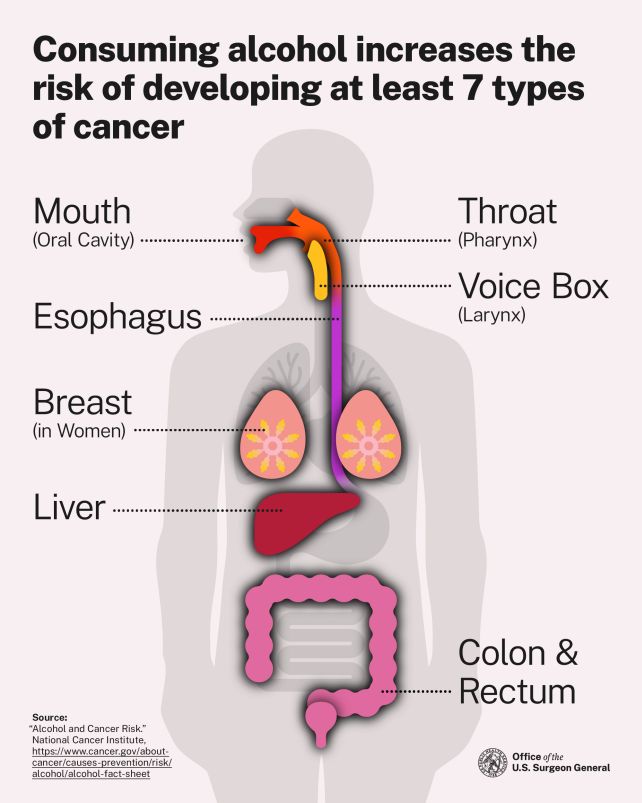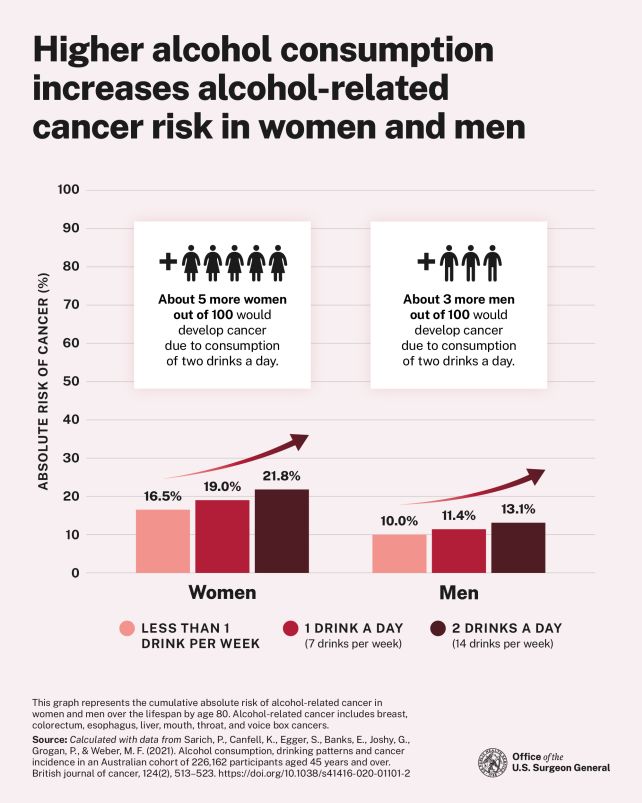An advisory issued by the US Surgeon General declares that there is no safe level of alcohol consumption.
According to a report based on a review of the available scientific literature, alcohol is implicated in the risk of a range of cancers, particularly breast cancer in women, followed by cancers that affect the digestive system.
In fact, alcohol alone is responsible for nearly 100,000 cancer cases and 20,000 cancer deaths per year in the US, the review finds.
"This body of scientific evidence demonstrates a causal relationship between alcohol use and increased risk for at least seven different types of cancer, including breast (in women), colorectum, esophagus, liver, mouth (oral cavity), throat (pharynx), and voice box (larynx)," the advisory states.
"The more alcohol consumed, the greater the risk of cancer. For certain cancers, like breast, mouth, and throat cancers, evidence shows that this risk may start to increase around one or fewer drinks per day."

Health advice on alcohol consumption can be somewhat mixed, with evidence suggesting that drinking in moderation may actually be beneficial to some aspects of one's health contrasting with studies that highlight harm to others.
The link between alcohol and cancer is known and established, but is usually correlated with heavy drinking, with the US Dietary Guidelines setting "healthy" limits of one to two drinks per day for men, and one or less for women.
Even that, the new advisory says, is too much. An estimated 17 percent of the 20,000 alcohol-related cancer deaths per year fall within the recommended consumption limits.
"In 2019, an estimated 96,730 cancer cases were related to alcohol consumption including 42,400 in men and 54,330 in women," the advisory states. "Globally, 741,300 cancer cases were related to alcohol consumption in 2020; 185,100 of those cases were related to consumption of approximately two drinks daily or fewer."
There are predominantly four mechanisms whereby alcohol can increase cancer risk; through an increase in oxidative stress that damages DNA and proteins; by altering hormone levels, significantly increasing breast cancer risk; by increasing the rate at which your body absorbs carcinogens; and by breaking down into a toxic compound called acetaldehyde, which also damages DNA.

"The largest burden of alcohol-related cancer in the US is for breast cancer in women with an estimated 44,180 cases in 2019, representing 16.4 percent of the approximately 270,000 total breast cancer cases for women," the report reveals.
The purpose of the advisory is to raise awareness of the link between cancer and alcohol consumption, since nearly half of all adult Americans are unaware a connection even exists. In fact, alcohol is considered a Group 1 carcinogen by the World Health Organization's International Agency for Research on Cancer. Other members of that group include formaldehyde, ionizing radiation, tobacco, processed meat, and asbestos.
The US Dietary Guidelines are due to be updated this year. The Surgeon General's office also recommends updating the warning labels on alcohol to include a warning about cancer risk, as well as improved education efforts across the board, so that individuals are able to make choices informed by the most up-to-date scientific evidence.
You can read through the full Surgeon General's Advisory and access its cited sources on the Office of the Surgeon General's website.
